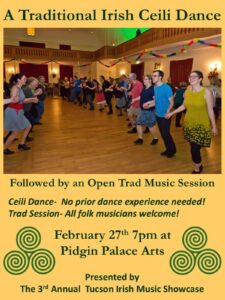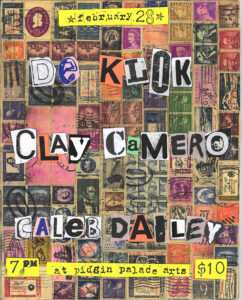Conversations on the Border
December 12, 2024 7:00pm
Chat
In conjunction with Pidgin Palace Arts’ current exhibition, COMPLEX artist David Taylor will be in conversation with activists, poets, scholars and writers. This is a free event.

Thursday, December 12, 7:00pm
Artist David Taylor will be in conversation with Alex Miller, Beth Weinstein and Kenny Wong.
Alex Miller is the Interim Executive Director at VECINA. She is deeply committed to the immigration justice movement and has broad experience representing asylum seekers, advocating for migrants’ access to justice, and working to amplify the impact of pro bono volunteers. After working in corporate law in New York for five years, Alex moved back to her hometown of Tucson, Arizona to work at the Florence Immigrant and Refugee Rights Project, ultimately leading their Border Action Team. From there, she joined the International Rescue Committee as the Director for Asylum Seekers and Families in Arizona, managing one of the primary border shelters in the state of Arizona. More recently, she was the Director of the Immigration Justice Campaign at the American Immigration Council, where she led a team dedicated to recruiting, training, and mentoring pro bono attorneys to increase migrants’ access to counsel. Alex attended Georgetown University for undergrad and Stanford Law School. Alex has taught Refugee Law and Policy as an Adjunct Professor of Law at the University of Arizona.
Beth Weinstein is an architect and associate professor at the University of Arizona and Co-founder of ReSI (Remembering Spaces of Internment). Her research investigates (dis)appearances and (in)visibilities related to climate catastrophe, states of exception, labor, and collaboration. She continues to ask what forms of architecture, and associated invisibilites, are produced through executive order and under states of exception. Working with archival documents, situated practices and architectural modes of representation, she constructs and choreographs performance-installations that render “sensible” razed sites and spaces of internment in the Southwest US and France.
Kenny Wong is a lecturer in the School of Landscape Architecture and Planning. He carries experience in the diverse facets of housing design and policy, with a concentration on affordable housing and community development. Driven by commitments to spatial and social justice, he has practiced as a housing advocate, multifamily designer, nonprofit developer, financial consultant, policy analyst and academic researcher between Southern California and the Oakland-East Bay Area. He was most recently the assistant director of design research at cityLAB, where his research explored connecting schools with housing development in the School Lands for Housing project and envisioned future scenarios of housing for the California 100. Creative design research and collaborative multidisciplinary approaches are crucial to his investigative and problem-solving methods as a teaching collaborator and former student in the Urban Humanities Initiative.
PAST:

Sunday, December 1 st , 2:00pm
Artist David Taylor will be in conversation with Susan Briante, Javier Duran, and Dora
Rodriguez.
Susan Briante is a professor of creative writing at the University of Arizona. She is the author of Defacing the Monument, her most recent publication in which Briante began taking graduate students to the US-Mexico border in 2016 to research and write about migration issues. What began as essays documenting the crisis turned into a reflection
on documentary poetics: the act of witnessing and writing about the suffering of others. Defacing the Monument shows what happens to those who do not hold the “correct” documents and highlights how the archive bears the marks of power. Part documentary, part lyric essay, part primer,Defacing the Monument is an exploration of the many ways we might tell stories and a guidebook for anyone who believes in what documentary poetics, and all art, can and should do in this moment of crisis.
Javier Duran (PhD) is Professor of Latin-American and Border Studies at the Center for Latin American Studies and the founding director of the Confluencenter for Creative Inquiry at the University of Arizona. He is a specialist in cultural and interdisciplinary studies along the U.S.-Mexico border and a native of the Arizona-Sonora desert region.
Dr. Duran is currently working on projects dealing with US-Mexico interdisciplinary transborder collaborations, border culture, necro-politics, human security, migrancy, checkpoints, cultural place-making and Indigenous Humanities.
Dora Rodriguez: In a life-saving attempt to flee El Salvador’s civil war in 1980, Dora Rodriguez was one of thirteen survivors found near death while crossing the border through the Sonoran Desert. By bravely publicizing her story of migration and through her unwavering support for migrants' rights, Dora’s image has been propelled to the forefront of the sanctuary movement in Tucson, AZ. Dora’s focus is to educate communities about the harsh realities migrants face in the desert and to inspire transformative changes to the immigration injustices plaguing our border towns. She serves as the Director of Salvavision, a nonprofit offering aid and support to migrant and
deportees.

